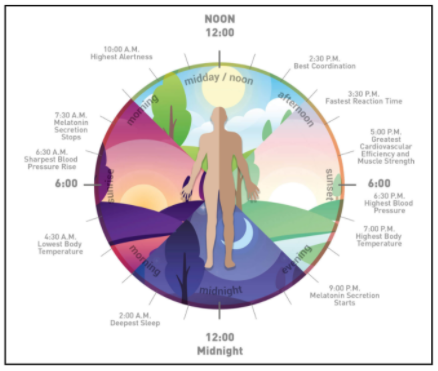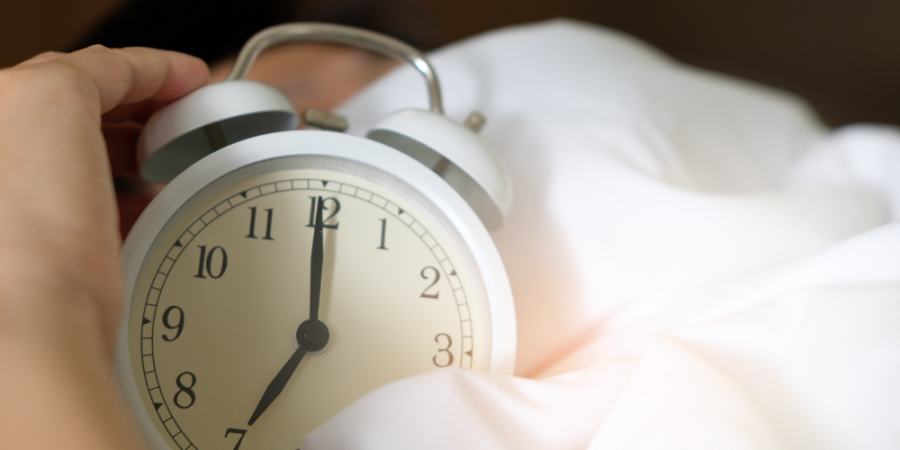The Circadian Rhythm: More Than a Sleep Cycle
A Look at the Circadian Rhythm
The times during which we feel sleepy, wake up, study, go on social media, and even eat are all interconnected. How? It’s simple: our bodies are equipped with a natural clock – the body clock. This internal clock can also be known as the circadian rhythm. You’ve probably heard of this term in the past, usually associated with sleep and wake times. However, the body’s circadian rhythm controls much more than our habits of hitting snooze. First, let’s look into the details of what the circadian rhythm actually is.
Over the years, organisms have evolved to understand changes in time. Every cell in our body has an internal clock that regulates functions based on the time of day. The circadian rhythm determines things such as peak alertness, muscular strength, melatonin release, and even body temperature. 
The word circadian has Latin origins. ‘Circa’ means ‘about’, and ‘diem’ means day – put together, circadian roughly means ‘around a day’. The circadian rhythm uses several cues from the external environment we live in. The primary factor for the circadian rhythm’s operation is light. Light is detected by the retina, which sends signals to the suprachiasmatic nucleus (SCN for short), a small cluster of cells in the hypothalamus.
The SCN controls all of the body’s organs. When it is working properly, all of our organs function well and in a timely fashion. Several factors are at play here. For example: a late night snack can disturb the scheduled functioning of our digestive system, which affects the entire body. Long hours of screen time before bed causes a similar effect, and in turn, the SCN is unable to function properly. Disturbances like these in the body’s biological clock can take days to recover from. Although the effects of this may be unseen in the present, repetitive fluctuations in the circadian rhythm can cause long term illnesses – such as obesity, diabetes, and dementia. But how does this actually work? Let’s take a closer look.
AT THE MOLECULAR LEVEL
Every cell in the human body has a nucleus. It’s the same for our brain cells, or neurons. The magic behind the circadian rhythm takes place here, in the nucleus of the cells in the SCN. The body clock is controlled by 2 major genes in DNA – Period and Cryptochrome. They are activated by proteins called BMAL 1 and CLOCK. The period and cryptochrome genes have spots on the DNA that are reserved for proteins, called Enhancer Boxes (E-Boxes). These areas are bound by proteins that initiate the transcription of certain genes.
BMAL 1 and CLOCK are tightly bound together inside the cell to form a complex. At night, this complex attaches onto an E-Box on the period and cryptochrome genes. This binding activates the production of 2 proteins called PER and CRY in the cell’s ribosomes. In the cytoplasm, PER and CRY proteins degrade due to certain enzymes. However, over a period of 12 hours, PER and CRY build up in the cytoplasm, and begin to bind together, forming a PER/CRY complex. This complex re-enters into the nucleus and removes the BMAL 1/ CLOCK complex from the period and cryptochrome genes. Did you catch the pattern? Essentially, PER/CRY inhibit their own creation, by inactivating the BMAL 1 / CLOCK complex. This cycle is called a transcriptional translational feedback loop. This entire process takes place over the course of 24 hours – a full day on Earth. Click HERE for an illustrated overview of this section.
THE IMPLICATIONS
Every cell in the body has its own internal clock that is coordinated by the “master clock”, the suprachiasmatic nucleus. The SCN analyzes light stimuli and sends signals to the pineal gland. The interaction between the SCN and the pineal gland controls all of the body’s functions, thus playing a major part in maintaining homeostasis. The activation of the pineal gland starts the processes of the circadian rhythm. 
Neural signals sent from the pineal gland are connected to the rest of the body and also the pituitary gland, the place where most of the hormones in our body are produced, stored, and released. These hormones include cortisol, metabolic hormones, HGH, and more. In addition, the pineal gland is directly responsible for producing and releasing melatonin.
Our daily environments are full of stimuli that can disrupt this system. For example, using devices shortly before bed can cause major issues in the cycle of the circadian rhythm. Blue light emitted from devices can disrupt the production of melatonin, due to its Having a late night snack can disrupt the cycles of the digestive system, which connects to several other body systems.
These habits that may seem trivial or insignificant now, can cause major issues such as diabetes, heart disease, cancer, and more severe illnesses in the future. Sleeping late, or not sleeping at all is also very common in recent times. Poor sleep habits are a leading cause of fatal long-term diseases, and even obesity. Instead of staying up past midnight to complete homework or study, sleep early and find time in the morning or earlier in the evening to complete work. Sleeping on time and getting a proper good night’s rest has been proven to drastically improve health and brain function. Furthermore, proper sleep can even help boost your immune system and increase overall health, as well.
The good thing is – we can take simple steps to prevent these consequences and keep our circadian rhythm functioning properly.
- Unplug earlier. Turning off all devices at least one hour before bed is a great way to help your sleep cycle. Reading a book, spending time with family, or coloring are much better ways to relax before bed.
- Limit caffeine intake. Drinking too much coffee or tea throughout the day, and especially later in the day can mess up your sleep schedule, which affects the entire body.
- Make sure your bedroom is dark and quiet. This can help you have a better, more peaceful sleep all night.
- Create a sleep schedule. Try to sleep and wake up at around the same time every day. This can help reset your circadian rhythm and help it function properly all throughout the day.
- Click HERE to learn more about factors that affect sleep.
The circadian rhythm controls so much more than sleep. It affects nearly all of our daily activities and body functions. By taking care of our lifestyle, we can help keep our systems in proper balance. Sleep is a major factor that plays into every part of our lives. Getting enough sleep every night can help prevent a plethora of future illnesses and maintain good health. Having a general daily routine (ex. sleeping, waking, and eating at the same time every day) has been proven to promote well-being. Sleep not only helps you feel rested in the morning, it is essential for healing and maintaining homeostasis.


